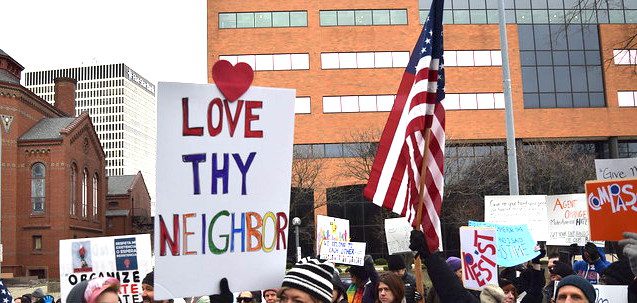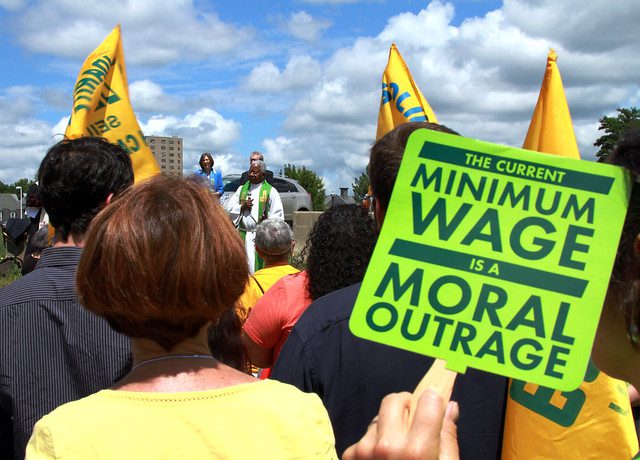| Trespassing for the Cause | Homes Not Jails (HNJ), a group advocating the use of vacant and abandoned housing for the homeless, has been busy on both sides of the country this summer. In San Francisco, members and supporters were arrested for occupying a condemned school building for nearly two days to publicize their demand that surplus city property be used for homeless shelters. San Francisco Supervisor Chris Daly, who has proposed that the city do just that, made an appearance outside the occupied building to show support. Meanwhile, in Washington, DC, HNJ members have stayed beyond an August 10th deadline to vacate an abandoned house they have occupied since last Thanksgiving. Some of the occupiers are using the house as a transition out of homelessness. The structure is owned by HUD, and HNJ is negotiating with HUD for the title, which it wants to transfer to a homeless family of three. (San Jose Mercury News, 8/14/01; Washington Post, 8/11/01) For more information, see www.homesnotjails.org. |
|
|
|
| Too Little Too Late? | Last July, Household International, whose lending arms are Household Finance and Beneficial, announced that it would stop selling single-premium credit insurance, a product considered predatory by fair lending advocates. (See Shelterforce #118.) It also put out a series of “best practices proposals.” However, the Association of Community Organizations for Reform Now (ACORN) says Household still has a long way to go. The proposals, ACORN asserts, do not include any change in such practices as financing excessive fees into loans, making spurious open-ended lines of credit, and trapping borrowers into high-rate loans for more than the value of their houses. The changes that are proposed have many loopholes. For a detailed analysis, see the predatory lending section of www.acorn.org or call Lisa Donner, ACORN, 718-246-7900. |
|
|
|
| Walking the Talk! | The Public Welfare Foundation opened its new headquarters this spring in a renovated historic building in Washington, DC’s trendy U Street district. Housing activists, worried that the renovation would contribute to further gentrification in the area, were pleasantly surprised when the foundation kept its promise to be a public steward. Following a two-year-long community planning process, the foundation turned over some parcels of land adjacent to its new building to Manna Community Development Corporation, which plans to establish a limited-equity co-operative there. (Responsive Philanthropy, Summer 2001) Public Welfare Foundation, 202-965-1800; www.publicwelfare.org. |
|
|
|
| Poverty Remains Stubborn | There was no progress in reducing poverty among single-mother families between 1995 and 1999, according to a report published by the Center on Budget and Policy Priorities (CBPP). The report, Poverty Trends for Families Headed by Working Single Mothers, 1993 to 1999, found that between 1995 and 1999 reductions in poverty due to an expanding economy were directly offset by contractions in government safety net programs, leaving the poverty level effectively the same. Jim Jaffe or Michelle Bazie, CBPP, 202-408-1080. |
|
|
|
| Tension Over Tent City | The city of Seattle wants to prioritize getting homeless people into permanent or transitional housing that meets housing codes. Seattle Housing and Resource Effort (SHARE) and Women’s Housing, Equality and Enhancement League (WHEEL) want to provide a safe place for homeless people to live in the interim. These should not be conflicting goals. Unfortunately, the city and SHARE have been caught up in an on-going battle over methods, funding, and priorities. Because Seattle has 2700 shelter beds for 6000 homeless people, SHARE and WHEEL have been maintaining a self-governing “Tent City,” usually housed in church parking lots, to take up the slack. The city has consistently opposed the encampment. Bob Santos, a former federal housing director, has been brought in to try to broker some solutions. He has recommended that the city purchase a two-story, bargelike structure currently moored on space rented from the Port of Seattle. The 23,000-square-foot facility, which would cost about $4 million and would need an additional $200,000 in repairs, has room for 512 people – a start, but not enough to make Tent City unnecessary. Meanwhile, Bill Rumpf, deputy director of Seattle’s housing office, has stated that there is currently no money earmarked for buying any housing. And the city recently faulted SHARE for fiscal and operational mismanagement in a harsh report charging among other things that the group has not been ensuring that all city money is going to its traditional shelters and not to Tent City. SHARE has accused the city of playing politics in an attempt to erode support for Tent City, while ignoring its recent petition for emergency funding. (Real Change, 6/28-7/11/01; Seattle Post-Intelligencer, 8/28/01) |
|
|
|
| A Strike Near Home | ACORN, a low-income membership organization and national leader in fighting for living wage laws and workers’ rights, has had to look at some of those issues from the other side this year. Four ACORN workers – the staff of the Seattle office – went on strike for 10 weeks starting February 26 over late and partial paychecks, lack of lunch breaks, lack of safety and harassment policies, and not receiving promised health insurance benefits. Starting salaries for ACORN organizers often hover near the minimum wage. The national office responded by encouraging the workers to organize their national staff. Maude Hurd, president of the ACORN Board, said, “We believe our staff should have the right to voluntarily organize a union if they so choose. As a national organization, our only concerns have been our interest in one national bargaining unit for all of our staff, if they seek a union, and that there be no supervisory domination of the bargaining unit.” The offer went on to say that national pay scales and personnel manuals made a national bargaining unit necessary. The striking workers wanted local representation and said they did not have the resources to organize the national staff. They returned to work on May 7 but quit two days later, charging that none of their concerns had been addressed. Seattle ACORN lost more than 100 members and allies – including approximately 15 percent of the local dues-paying membership base – over the conflict. (Real Change, 6/14-27/01) |
|
|
|
| Upcharging Sanctioned by Court | The 7th U.S. Circuit Court of Appeals has given the green light to title companies and mortgage lenders to charge whatever they want for items like title searches and closing fees, regardless of their actual costs. The court’s decision rejects long-standing efforts by HUD to treat such markups as illegal because the buyers are a captive audience. Unless reversed by the Supreme Court, the appellate court’s decision is now federal law in Illinois, Wisconsin, and Indiana, and other courts are likely to cite the new decision as a precedent. (Seattle Times, 8/19/01) |
|
|
|
| A Hard Call | A recent proposal by Wisconsin’s Public Service Commission (PSC) to provide free voice mail to the homeless divided even homeless advocates. The proposal would have cost $40,000 over two years. Proponents argued that voice mail can be an anchor in a life marked by inconstancy and an essential connection to family members, potential employers, and doctors. Other advocates argued that the money should be used for prevention, job training, mental health treatment, and keeping shelters open. Voice mail for the homeless is not a new idea. Since 1991, the Community Technology Institute has set up 35 similar systems from Seattle to New York, with at least one receiving government funding. The Wisconsin program is still technically active, but thanks in part to negative hype on local talk shows, the legislature has withdrawn funding and implementation is on hold. (Milwaukee Journal-Sentinel, 8/11,14 22/01) |
|
|
|
| San Diego Budgets for Integration | San Diego’s latest city budget includes a new relocation fund to help low-income and minority families move to less concentrated areas. The new fund will help pay for security deposits, loan closings, and other moving costs. California Housing Integration Set-Aside (CalHISA), a task force that lobbied for the provision, says the fund will provide encouragement for home seekers considering different neighborhoods, expanding their housing choices and resulting in less concentration of poverty and minorities across the whole city. Dr. Juliet Saltman, CalHISA Task Force, [email protected]. |
|
|
|
| Bonds for Moderate-Income Housing | A new taxable bond program launched by the New York City Housing Development Corporation (HDC) in February is beginning to bear fruit. The program gives developers fast, though more expensive, access to financing if they agree to devote a fifth of their buildings to apartments for families earning up to 80 percent of the median income. This limit is higher than the 50-percent-of-median limit on the existing developer set-aside program. The goal is to serve those in need who don’t qualify for many existing programs. One apartment complex with more than 350 units has gotten the green light under the program, and HDC is working with three other interested developers. (The New York Times, 8/3/01) |
Shelter Shorts
Shelter Shorts 2002
Trespassing for the Cause Homes Not Jails (HNJ), a group advocating the use of vacant and abandoned housing for the homeless, has been busy on both sides of the country […]




Comments